Appeals for GCSE, AS, A level and Project qualifications: 2019/20 academic year
Published 25 May 2021
Applies to England
This release presents the number of appeals made during the 2019/20 academic year in England for GCSE, AS and A level and Project qualifications. The exam series covered include all exam series where the qualifications were available: November 2019 and June 2020 for GCSE qualifications, June 2020 for GCE qualifications and November 2019, January 2020 and June 2020 for Project qualifications. It also gives information on the number of qualification grades challenged and changed due to those appeals.
Exams were cancelled in summer 2020 following the closure of schools and colleges to most students, as part of the response to the coronavirus (COVID-19) pandemic. As part of the exceptional arrangements for exam grading and assessment in 2020, students ultimately received the higher of a centre assessed grade or calculated grade for GCSE, AS and A level. Following consultation, we published the grounds on which a school or college could submit an appeal to an exam board in summer 2020. There were additional grounds for appeals in summer 2020, including where the exam board did not apply its procedures properly and fairly or where the data used by the exam board to calculate results contained an error. Examples of the sorts of errors that the data could contain included the following:
- The head of centre had evidence that the school or college made a mistake when submitting the centre assessment grades to the exam board.
- The head of centre had evidence that the exam board introduced an error into the centre assessment grade data submitted to it or when it communicated a grade.
- The exam board used the wrong data when statistically standardising some students’ results.
A student could not appeal because they disagreed with their school or college’s professional judgement of the grade the student would most likely have achieved if exams had taken place. However, if a student thought their grade might have been affected by wrongdoing or a lack of care taken by their school or college (malpractice or maladministration), including if they had evidence of bias or discrimination, that student could ask the awarding organisation to investigate. These instances were not considered appeals, rather they were a malpractice or maladministration complaint. Guidance on the kinds of evidence that would have been considered for this purpose is available in our student guide to appeals, malpractice & maladministration complaints: summer 2020.
For summer 2020 results, the standard post-results services, including reviews of marking, were not available. Instead there was a different appeals process, consisting of two stages:
-
An initial review, in which a suitable member of an exam board’s staff checked the relevant data, procedure or process depending on the nature of appeal.
-
An independent review. If a centre was not satisfied with the outcome of the initial review, they had 14 calendar days from the outcome to request an independent review. The independent review was carried out by an independent decision maker (i.e. someone who had not been directly employed by the awarding body, was not an examiner or moderator working for the awarding body and was not connected to the awarding body in any other way).
Due to the exceptional nature of the appeals process in summer 2020, direct comparisons of appeals in 2019/20 and previous years will not be valid and should be to be treated with caution. Please also note that a number of appeals for summer 2020 were still being processed at the time of the provisional summer 2020 appeals publication in December. This release gives updated figures, when the majority of appeals have been completed.
1. Details
The main findings regarding the number of appeals made for GCSE, GCE (AS and A level) and Project qualifications for the 2019/20 academic year in England were:
-
One appeal may cover several grades and the number of appeals received for GCSEs and GCEs (AS and A levels) in 2019/20 was 3,625. Of these appeals 2,995 (83% of appeals received) were upheld.
-
Overall, 27,560 (0.45%) of the 6.1 million grades certified for GCSEs and GCEs (AS and A levels) were challenged.
-
Of the 27,560 GCSE and GCE grades challenged, 4,890 (18% of grades challenged) were changed.
-
Centre error was the most common reason for GCSE and GCE appeals.
-
For Project qualifications in 2019/20 there were 15 appeals received and 20 grades challenged.
2. Qualification and exam series breakdown
2.1 GCSE, GCE and Project qualifications
The number of appeals received by exam series for GCSEs, GCEs and Project qualifications
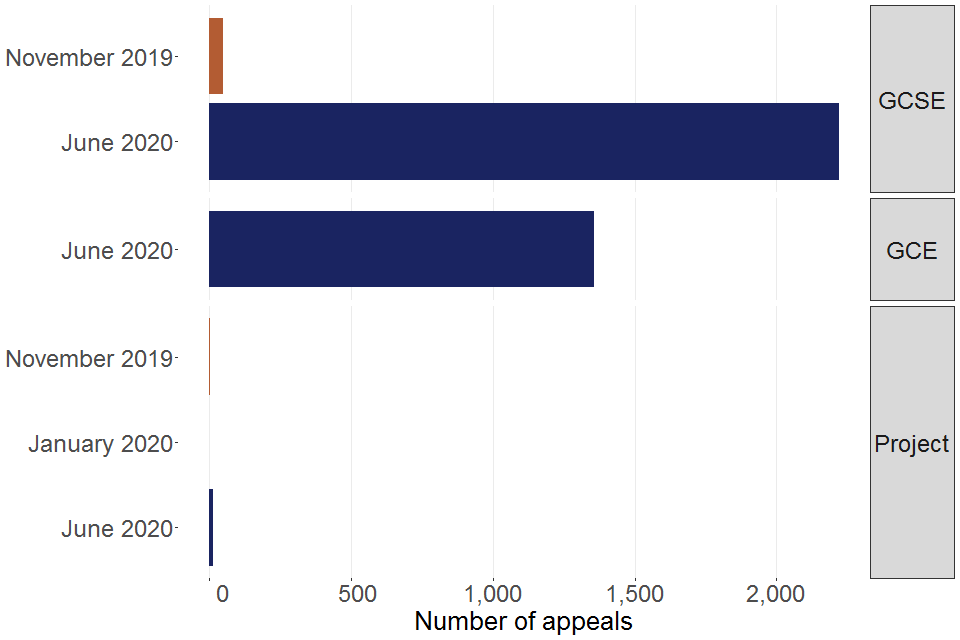
The number of appeals received by exam series for GCSEs, GCEs and Project qualifications. Full details can be found in table 1.
Table 1: Number of appeals received by exam series for GCSEs, GCEs and Project qualifications
| Exam series | GCSE | GCE | Project |
|---|---|---|---|
| November 2019 | 50 | - | 0~ |
| January 2020 | - | - | 0 |
| June 2020 | 2,220 | 1,355 | 15 |
3. Total number of appeals received, upheld and leading to a grade change
Usually, an appeal may be submitted by a centre if they are dissatisfied with the result of a review of marking or moderation or if they wish to contest the outcome of a reasonable adjustment or special consideration request, or a malpractice decision. The appeal may be upheld at either a preliminary appeal or an appeal hearing, and this may lead to a change in one or more of the qualification grades involved.
In summer 2020, an appeal could have been submitted by a centre on the grounds that the exam board did not apply its procedures properly and fairly or where the data used by the exam board to calculate results contained an error.
For summer 2020 the standard post-results service was not available and there was a different appeals process, which consisted of two stages. The appeal could have been upheld at either an initial review or an independent review, and this may have led to a change in one or more of the qualification grades involved.
In all exam series, an appeal can represent one candidate, or several, if related to the same potential issue. Furthermore, if an appeal which progressed to an independent review or an appeal hearing was not upheld but was upheld at an initial review or preliminary appeal, the appeal as a whole is reported as upheld.
Due to the exceptional nature of the appeals process in summer 2020, direct comparisons of appeals in 2019/20 and previous years are not valid and need to be treated with caution.
The data tables and charts contain figures on all grounds of appeals according to all exam boards.
3.1 GCSE
The number of appeals received, appeals upheld and appeals leading to grades changed has increased sharply for GCSE in 2019/20 reflecting the different nature of the appeal arrangements in summer 2020.
The number of appeals received, appeals upheld and appeals leading to grades changed for GCSE from 2016/17 to 2019/20
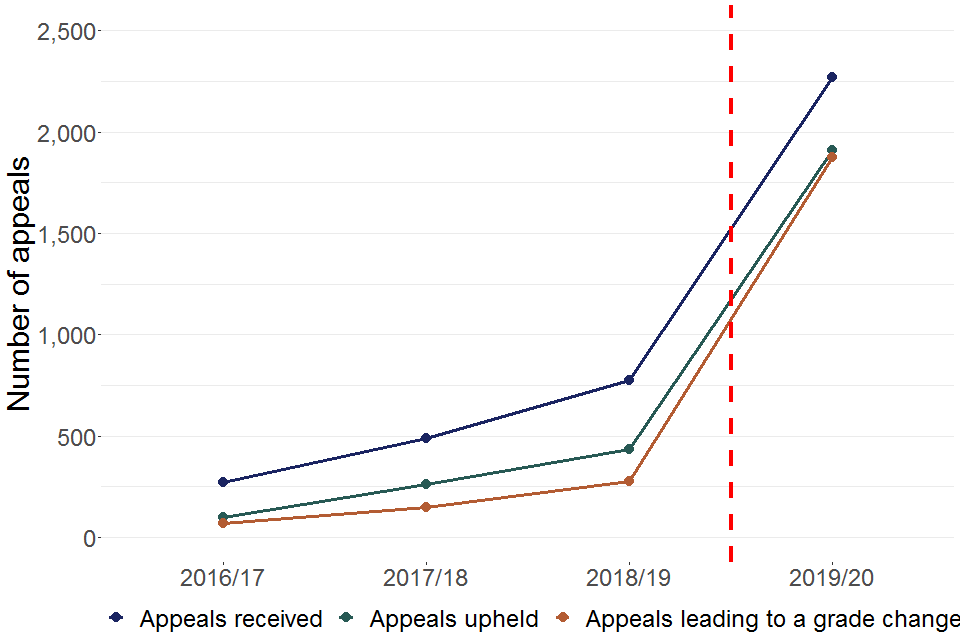
The number of appeals received, appeals upheld and appeals leading to grades changed for GCSE from 2016/17 to 2019/20. Full details can be found in table 2.
The percentage of appeals upheld has increased for GCSE in 2019/20 reflecting the different nature of the appeal arrangements in summer 2020.
The percentage of appeals upheld for GCSE from 2016/17 to 2019/20
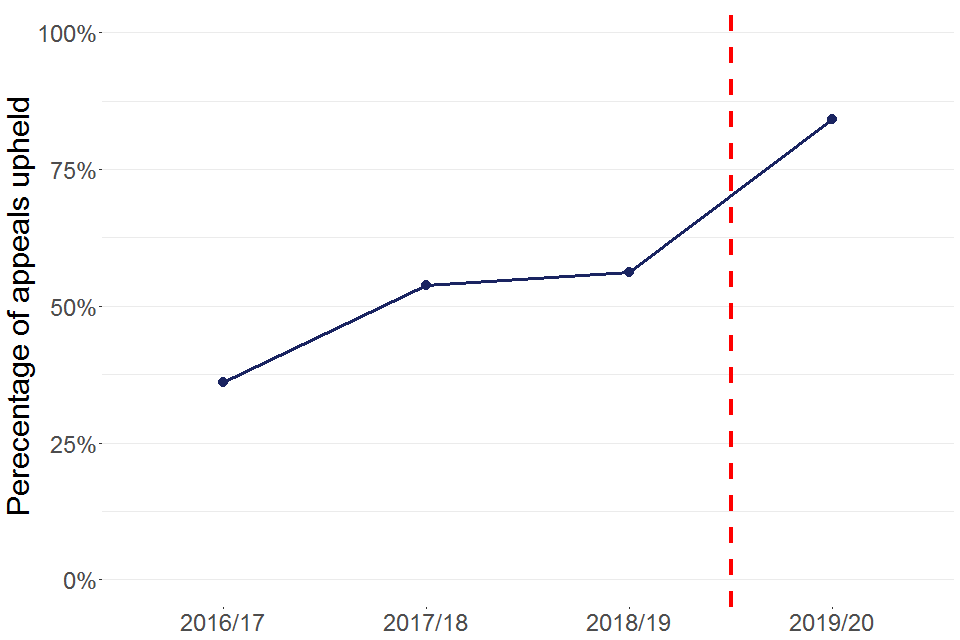
The percentage of appeals upheld for GCSE from 2016/17 to 2019/20. Full details can be found in table 2.
Table 2: The number of appeals received, appeals upheld and appeals leading to a grade change at GCSE in 2019/20
| Year | Appeals received | Appeals upheld | % of appeals upheld | Appeals leading to at least one grade change | % of upheld appeals leading to at least one grade change |
|---|---|---|---|---|---|
| 2016/17 | 270 | 100 | 36% | 65 | 68% |
| 2017/18 | 490 | 265 | 54% | 150 | 56% |
| 2018/19 | 775 | 435 | 56% | 275 | 63% |
| 2019/20 | 2,270 | 1,910 | 84% | 1,875 | 98% |
Note: Data for November series was not collected for GCSEs in 2016/17
The number of GCSE appeals increased from 775 in 2018/19 to 2,270 in 2019/20. The number of appeals upheld increased from 435 in 2018/19 to 1,910 in 2019/20 and the number of appeals upheld which led to a grade change has increased from 275 in 2018/19 to 1,875 in 2019/20. The percentage of appeals upheld in 2019/20 has increased (84%) compared with 56% in 2018/19.
The changes between 2018/19 and 2019/20 reflect the difference in the appeals process in summer 2020. Direct comparisons between years are not valid and need to be treated with caution
3.2 GCE
The number of appeals received, appeals upheld and appeals leading to grades changed has increased sharply for GCE in 2019/20 reflecting the different nature of the appeal arrangements in summer 2020.
The number of appeals received, appeals upheld and appeals leading to grades changed for GCSE from 2016/17 to 2019/20
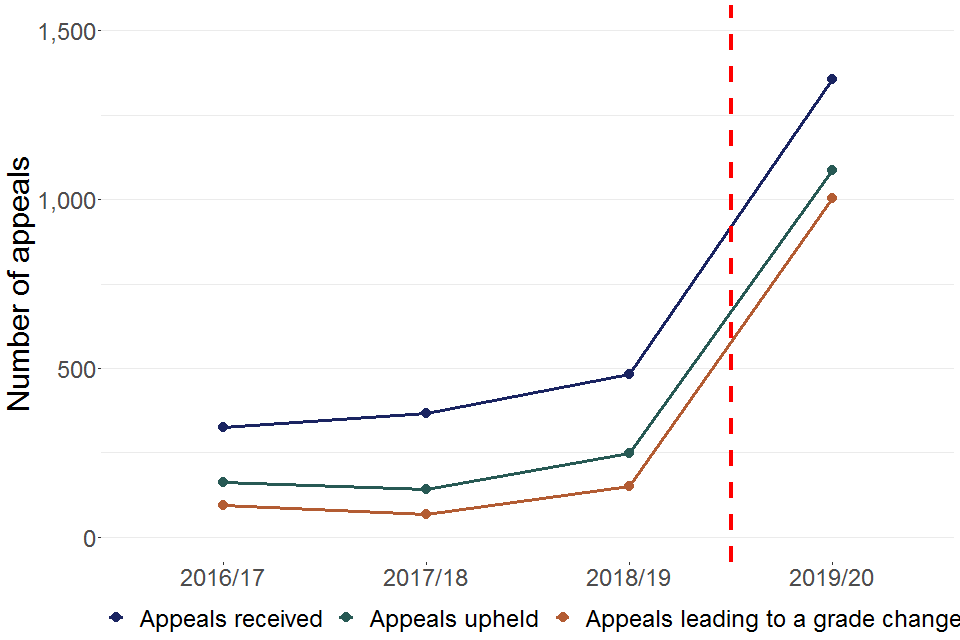
The number of appeals received, appeals upheld and appeals leading to grades changed for GCE from s2016/17 to 2019/20. Full details can be found in table 3.
The percentage of appeals upheld has increased for GCE in 2019/20 reflecting the different nature of the appeal arrangements in summer 2020.
The percentage of appeals upheld for GCE from 2016/17 to 2019/20
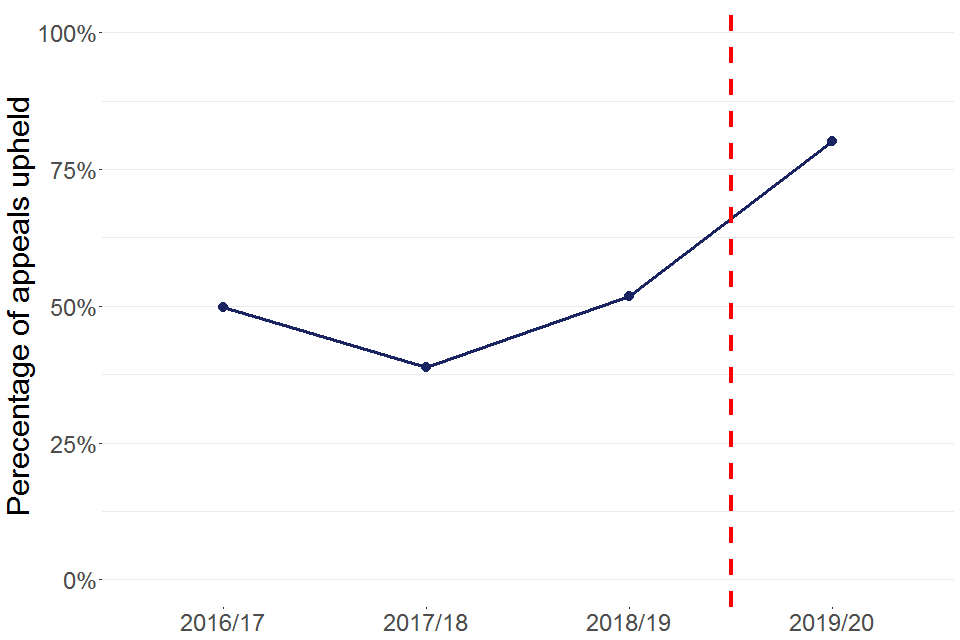
The percentage of appeals upheld for GCE from 2016/17 to 2019/20. Full details can be found in table 3.
Table 3: The number of appeals received, appeals upheld and appeals leading to a grade change at GCE in 2019/20
| Year | Appeals received | Appeals upheld | % of appeals upheld | Appeals leading to at least one grade change | % of upheld appeals leading to at least one grade change |
|---|---|---|---|---|---|
| 2016/17 | 325 | 160 | 50% | 95 | 57% |
| 2017/18 | 370 | 145 | 39% | 70 | 48% |
| 2018/19 | 480 | 250 | 52% | 150 | 61% |
| 2019/20 | 1,355 | 1,085 | 80% | 1,000 | 92% |
The number of GCE appeals increased from 480 in 2018/19 to 1,355 in 2019/20. The number of appeals upheld increased from 250 in 2018/19 to 1,085 in 2019/20 and the number of appeals upheld which led to a grade change has increased from 150 in 2018/19 to 1,000 in 2019/20. The percentage of appeals upheld in 2019/20 has increased (80%) compared with 52% in 2018/19.
The changes between 2018/19 and 2019/20 reflect the difference in the appeals process in summer 2020. Direct comparisons between years are not valid and need to be treated with caution
4. Nature of appeals in November 2019 and Summer 2020
In summer 2020 an appeal could be made for a range of reasons:
- Procedural inconsistencies - where the exam board did not apply procedures consistently or procedures were not followed properly and fairly
- Incorrect result issued - where a result generated by applying the process set out under Condition GQCov3.2(a)(i) was incorrectly issued by the exam board in respect of one or more learners
- Centre error - the centre provided the exam board with incorrect data
- Incorrect dataset – AO error - where the exam board used an incorrect data set
- Error introduced by AO - the exam board introduced errors into a specified data set
- Exceptional factor - in exceptional circumstances, the centre established an exceptional factor that undermined the assumption that using a default data set for statistical standardisation was the most likely to lead to consistent results.
None of these grounds for appeals existed in previous years or exam series.
Prior to summer 2020, an appeal could be made for a range of reasons, for instance: to contest the result of a review of marking or a review of moderation, or to contest a malpractice decision or a decision on reasonable adjustments or special consideration.
4.1 GCSE
Centre error was the most common ground for GCSE appeal in 2019/20 with 2,065 appeals received.
Nature of GCSE appeals for 2019/20
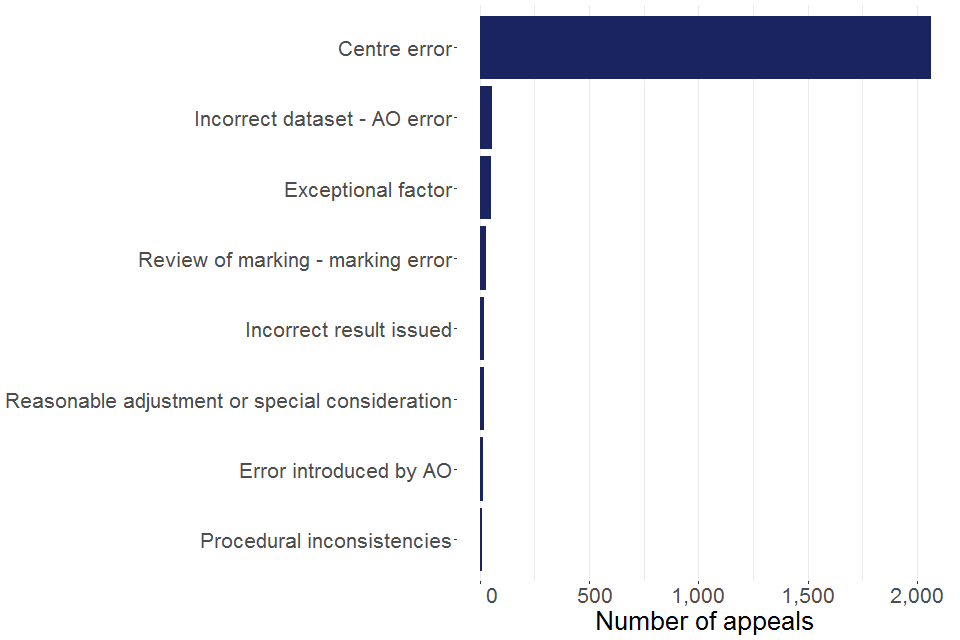
Nature of GCSE appeals for 2019/20. Full details can be found in table 4.
Table 4: Nature of GCSE appeals
| Nature of appeal | Number of appeals received |
|---|---|
| Centre error | 2,065 |
| Exceptional factor | 55 |
| Incorrect dataset - AO error | 55 |
| Review of marking - marking error | 30 |
| Incorrect result issued | 20 |
| Reasonable adjustment or special consideration | 20 |
| Error introduced by AO | 15 |
| Procedural inconsistencies | 10 |
4.2 GCE
Centre error was the most common ground for GCE appeal in 2019/20 with 1,245 appeals received.
Nature of GCE appeals for 2019/20
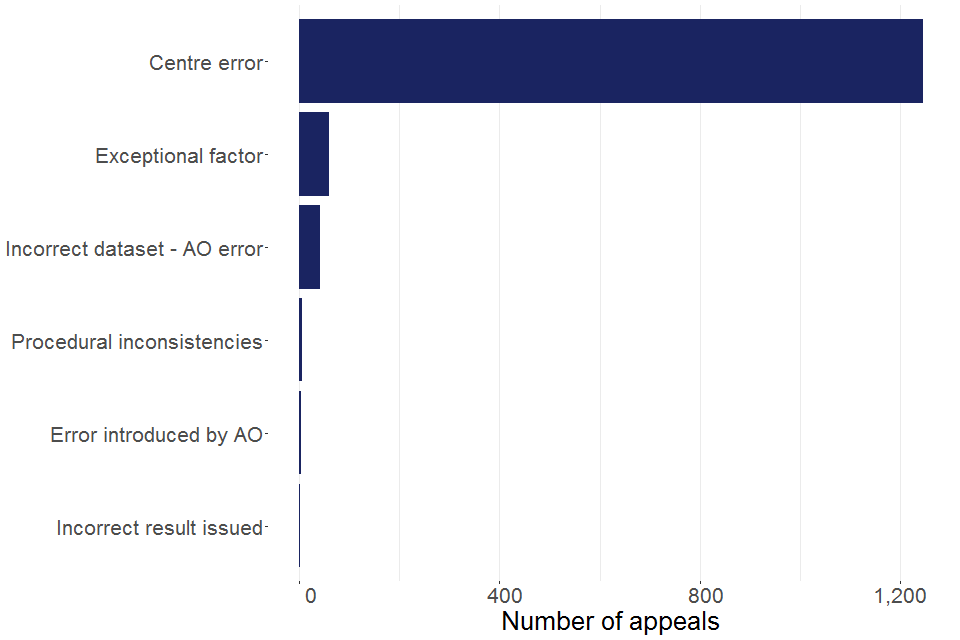
Nature of GCE appeals for 2019/20. Full details can be found in table 5.
Table 5: Nature of GCE appeals
| Nature of appeal | Number of appeals received |
|---|---|
| Centre error | 1,245 |
| Exceptional factor | 60 |
| Incorrect dataset - AO error | 40 |
| Procedural inconsistencies | 5 |
| Error introduced by AO | 0~ |
| Incorrect result issued | 0~ |
5. Initial and independent reviews Summer 2020 and preliminary appeals and appeals hearings November 2019
As previously mentioned, for summer 2020 results, there was a different appeals process, consisting of two stages:
-
An initial review
-
An independent review
This differs from how appeals are normally implemented in the standard post-results service which consists of 2 stages:
-
A preliminary appeal which is a review by a senior exam board member who has not been previously involved in the individual case. As a result of a preliminary appeal, the case is or is not upheld
-
An appeal hearing which is where the applicant and exam board present their cases to the panel. Appeal hearings occur if the applicant is dissatisfied with the result of the preliminary appeal, they may decide to progress to an appeal hearing (a stage 2 appeal).
An appeal panel consists of 3 or more members, at least one of which is independent (i.e. has not been an employee, examiner, committee or board member of the exam board in the previous 5 years).
Due to the differences of the summer 2020 appeals process, comparisons with previous years are not possible. As such, data from November 2019 and Summer 2020 are presented in different tables.
5.1 Summer 2020
80% of all appeals received in summer 2020 resulted in at least one grade change.
Table 6: The nature of appeals received and appeals resulting in a grade change for summer 2020 for GCSE and GCE
| Qualification level | Number of initial reviews | Number of independent reviews | % of initial reviews leading to independent reviews | Number of initial reviews leading to at least one grade change | Number of independent reviews leading to at least one grade change |
|---|---|---|---|---|---|
| GCSE | 2,220 | 45 | 2% | 1,835 | 20 |
| GCE | 1,355 | 70 | 5% | 975 | 30 |
5.2 November 2019
49% of all appeals received in November 2019 resulted in at least one grade change.
Table 7: The nature of appeals received and appeals resulting in a grade change for November 2019 for GCSE
| Qualification level | Number of preliminary appeals | Number of appeal hearings | % of preliminary appeals leading to appeal hearings | Number of preliminary appeals leading to at least one grade change | Number of appeal hearings leading to at least one grade change |
|---|---|---|---|---|---|
| GCSE | 50 | 0\~ | 2% | 25 | 0\~ |
6. Grades challenged and changed
A single appeal may represent one or more qualification grades which are being challenged, for example when a centre appeals its results for a qualification taken by a number of its students. An upheld appeal may result in a change to all, some, or none of the associated qualification grades. Therefore, an increase or decrease in appeals received may not be mirrored in the number of grades challenged or changed.
Additionally, a candidate may be involved in more than one appeal. In 2019/20, there were 21,583 GCSE and GCE candidates whose grades were involved in an appeal. There were 4,890 (0.08%) of the approximately 6.1 million grades certified for these qualifications in 2019/20 that were changed as part of an upheld appeal.
The number of grades changed or unchanged does not include cases where either the initial or resulting qualification grade is unknown. In 2019/20 there were fewer than 5 GCSE grades and no GCE grades where either the initial or resulting qualification grade was unknown.
There were 24,010 grades challenged and 3,470 grades changed for GCSE and 3,550 grades challenged and 1,420 grades changed for GCE in 2019/20.
The number of grades challenged and changed in 2019/20 for GCSE and GCE
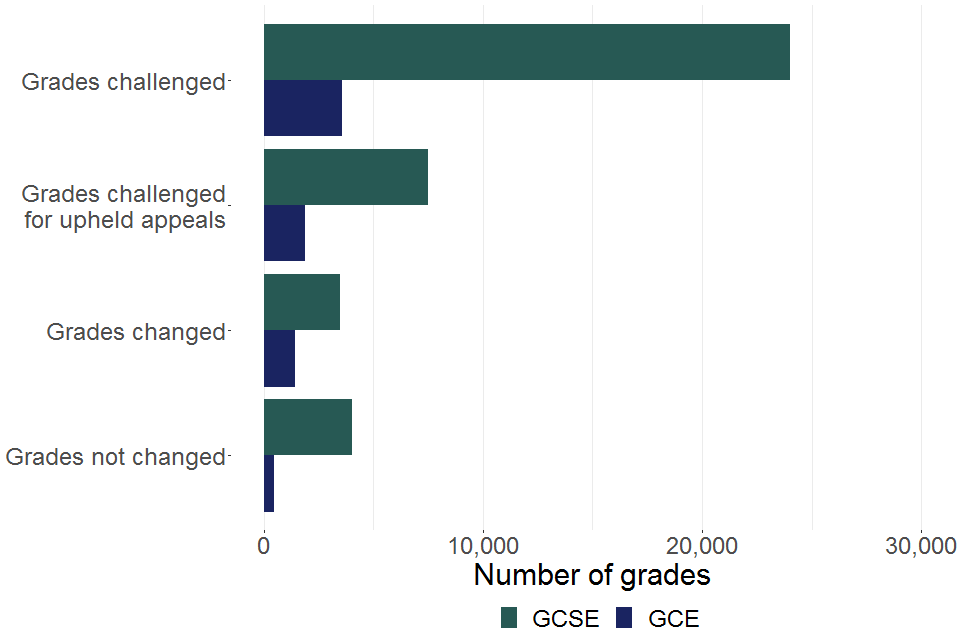
The number of grades challenged and changed in 2019/20 for GCSE and GCE. Full details can be found in table 8.
Table 8: The number of grades challenged and changed in 2019/20 for GCSE and GCE
| Qualification level | Grades challenged | Grades challenged for upheld appeals | Grades changed | Grades not changed |
|---|---|---|---|---|
| GCSE | 24,010 | 7,475 | 3,470 | 4,005 |
| GCE | 3,550 | 1,900 | 1,420 | 480 |
7. Completion within exam boards’ target timescales
The target timescales in 2019/20 differed according to exam series. In Summer 2020 there were:
- 6 weeks to complete an initial review from receipt of the application
- 6 weeks to complete an independent review from the receipt of a request for an independent review.
In November 2019 there were:
- 6 weeks to complete a preliminary appeal from receipt of the application
- 10 weeks to complete an appeal hearing from the receipt of a request for an appeal hearing.
For 2019/20, there are fewer than 5 GCE and no GCSE appeals which were still in progress at the date of data submission. These might or might not have been completed within the target timescale.
7.1 Summer 2020
Table 9: Completion of GCSE and GCE appeals within exam boards’ target timescales in Summer 2020
| Qualification level | Initial reviews received | Initial reviews completed in time | Independent reviews received | Independent reviews completed in time |
|---|---|---|---|---|
| GCSE | 2,220 | 2,145 | 45 | 45 |
| GCE | 1,355 | 1,335 | 70 | 65 |
In Summer 2020, 97% of the 2,220 GCSE initial reviews and 98% of the 45 GCSE independent reviews were completed within the target time. Furthermore, 98% of the 1,355 GCE initial reviews and 93% of the 70 GCE independent reviews were completed within the target time.
The median number of days to complete a GCSE and GCE initial review was 14 and 12 days respectively. The median number of days to complete a GCSE and GCE independent review was 28 and 25 days respectively.
Overall, 97% of all GCSE Summer 2020 appeals and 98% of all GCE Summer 2020 appeals were completed within the target time.
7.2 November 2019
Table 10: Completion of GCSE appeals within exam boards’ target timescales in November 2019
| Qualification level | Preliminary appeals received | Preliminary appeals completed in time | Appeal hearings received | Appeal hearings completed in time |
|---|---|---|---|---|
| GCSE | 50 | 50 | 0~ | 0 |
In November 2019, 100% of the 50 GCSE preliminary appeals and 0% of the fewer than 5 GCSE appeal hearings were completed within the target time. The median number of days to complete a GCSE and GCE initial review preliminary appeal was 10 days and the median number of days to complete a GCSE appeal hearing was 77 days.
Overall, 98% of all GCSE November 2019 appeals were completed within the target time.
8. Grades challenged at appeal
Grade 3 was the most contested grade for GCSE 9 to 1, grade 4-4 the most contested grades for GCSE combined science and grade B the most contested grade for GCE.
Grades challenged at appeal in 2019/20 for GCSE 9 to 1, GCSE: combined science and GCE
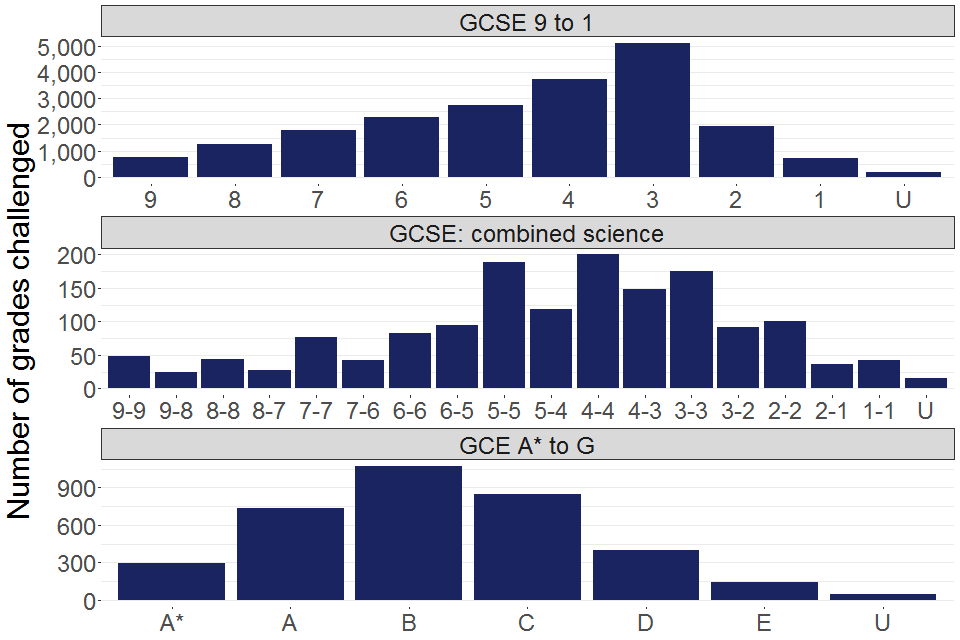
Grades challenged at appeal in 2019/20 for GCSE 9 to 1, GCSE combined science and GCE. Full details can be found in table 7 of the accompanying data tables.
Source: Table 7: Data tables for appeals for GCSE, AS, A level and Projects: 2019 to 2020 academic year
9. Raw mark changes for upheld appeals
There were no marks awarded in summer 2020 and therefore appeals following the Summer 2020 exam series did not result in any mark changes.
In the GCSE November 2019 series, there were 30 grades which marks changed following an appeal and the majority of mark changes were of 1 or 2 marks respectively.
For a full breakdown please see our published data tables Table 8: Data tables for appeals for GCSE, AS, A level and Projects: 2019 to 2020 academic year
10. Grade changes for upheld appeals
The charts in this section show the magnitude of grade changes made following an upheld appeal in 2019/20. A small number of upheld appeals were in respect of candidates whose original grade was unknown. Those cases do not appear in these graphs. These graphs also do not include instances where the post appeal qualification grade is not known.
10.1 GCSE
Where an appeal was upheld and the original and resulting grades were known, 100% of GCSE grades challenged had a grade change of one or more grade in 2019/20.
GCSE grades changed for upheld appeals
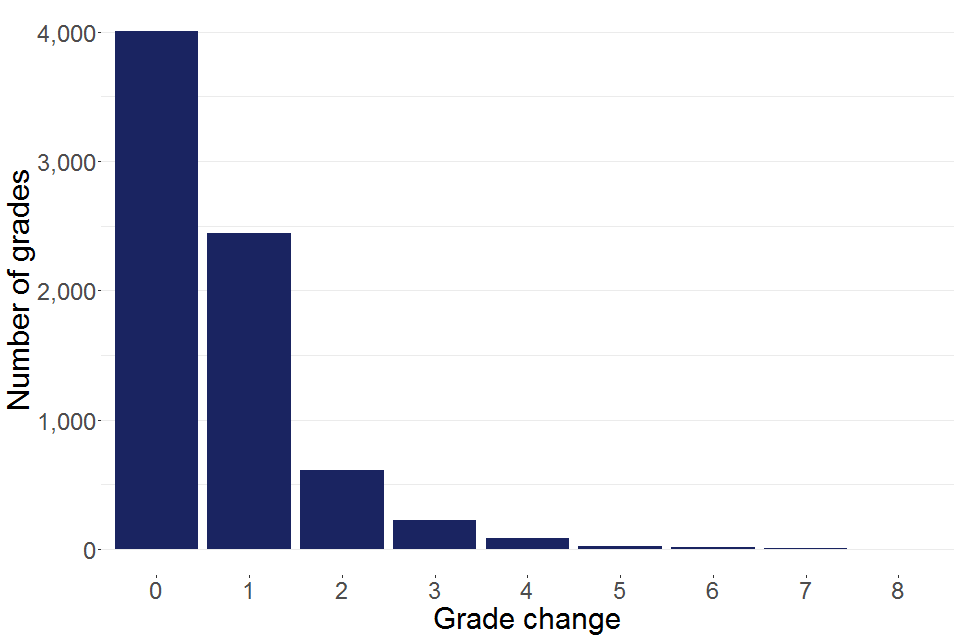
Grade changes for grades challenged from upheld appeals at GCSE. Full details can be found in table 11.
Table 11: GCSE grades changed for upheld appeals
| Magnitude of change in grade | Number of grades | % of grades |
|---|---|---|
| 0 | 4,005 | 54 % |
| 1 | 2,440 | 33 % |
| 2 | 610 | 8 % |
| 3 | 220 | 3 % |
| 4 | 85 | 1 % |
| 5 | 25 | 0 % |
| 6 | 15 | 0 % |
| 7 | 0~ | 0 % |
| 8 | 0~ | 0 % |
For appeals that were upheld (and where the original and resulting grades were known), 54% of GCSE grades challenged did not result in a qualification grade change in 2019/20. Of the grades that changed, 72% changed by one grade and 28% resulted in a change of 2 or more grades.
10.2 GCE
Where an appeal was upheld and the original and resulting grades were known, 100% of GCE grades challenged had a grade change of one or more grade in 2019/20.
GCE grades changed for upheld appeals
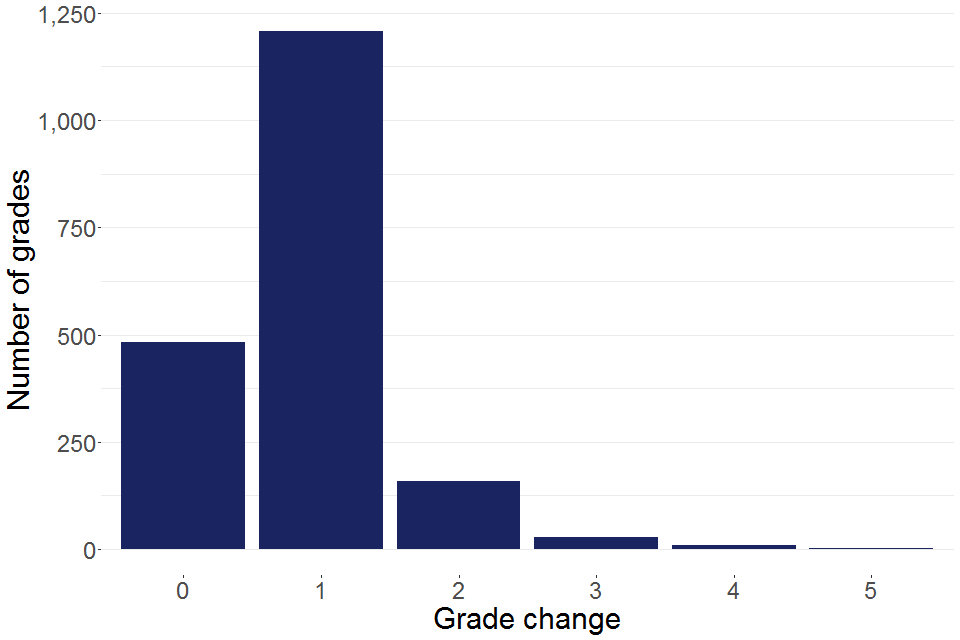
Grade changes for grades challenged from upheld appeals at GCE. Full details can be found in table 12.
Table 12: GCE grades changed for upheld appeals
| Magnitude of change in grade | Number of grades | % of grades |
|---|---|---|
| 0 | 480 | 26 % |
| 1 | 1,210 | 64 % |
| 2 | 160 | 8 % |
| 3 | 30 | 1 % |
| 4 | 10 | 0 % |
| 5 | 0~ | 0 % |
For appeals that were upheld (and where the original and resulting grades were known), 26% of GCE grades challenged did not result in a qualification grade change in 2019/20. Of the grades that changed, 86% changed by one grade and 14% resulted in a change of 2 or more grades.
11. Project qualifications
Table 13: Appeals received, appeals upheld, grades challenged and grades changed for project qualifications in 2019/20
| Year | Appeals received | Appeals upheld | Grades challenged | Grades changed |
|---|---|---|---|---|
| 2017/18 | 0~ | 0~ | 15 | 0~ |
| 2018/19 | 10 | 0~ | 335 | 0~ |
| 2019/20 | 15 | 15 | 20 | 15 |
In 2019/20, there were 20 candidates for Project qualifications whose grades were involved in an appeal. Approximately 0.03% (15) of the 47.6 thousand grades certified for projects in 2019/20 were changed as a result of an appeal.
The number of appeals for Project qualifications increased from 10 in 2018/19 to 15 in 2019/20. The number of appeals upheld increased from fewer than 5 in 2018/19 to 15 in 2019/20 and the number of appeals upheld which led to a grade change has increased from fewer than 5 in 2018/19 to 10 in 2019/20. The percentage of appeals upheld in 2019/20 has increased (87%) compared with 11% in 2018/19. The changes between 2018/19 and 2019/20 reflect the difference in the appeals process in summer 2020. Direct comparisons between years are not valid and need to be treated with caution.
12. Contextual information
This report presents data on requests for appeals made to exam boards for the academic year 2019/20. The qualifications covered in this report are GCSEs, GCEs (AS and A level) and Project qualifications in England.
In Summer 2020, appeals could be submitted by a school or college if they believed that an exam board did not apply its procedures properly and fairly or where the data used by the exam board to calculate results contained an error. Appeals were made at the subject level and, if related to the same issue, may cover more than one candidate. The Joint Council for Qualifications (JCQ) guide to the awarding bodies’ appeals process describes 2 steps for appeals in summer 2020:
-
An initial review, in which a suitable member of an exam board’s staff checked the relevant nature, procedure or process depending on the nature of appeal.
-
An independent review. If a centre was not satisfied with the outcome of the initial review, they had 14 calendar days from the outcome to request an independent review. The independent review was carried out by an independent decision maker (i.e. someone who has not been directly employed by the awarding body, was not be an examiner or moderator working for the awarding body and was not connected to the awarding body in any other way).
However, prior to summer 2020, appeals could be submitted if a school or college was dissatisfied with the result of a review of marking, review of moderation, a malpractice decision, or the outcome of a reasonable adjustment or special consideration request. As in summer 2020, appeals were made at the exam component level and, if related to the same issue, could cover more than one candidate. The Joint Council for Qualifications (JCQ) guide to the awarding bodies’ appeals process describes 2 steps for appeals prior to summer 2020:
-
Preliminary appeal (previously ‘stage 1’ appeal): a review by a senior exam board member who has not previously been involved with the particular case.
-
Appeal hearing (previously ‘stage 2’ appeal): applicants and awarding bodies present their respective cases to the panel of 3 or more members, one of which must be independent of the exam board.
Due to the exceptional nature of the appeals process in summer 2020, direct comparisons of appeals in 2019/20 and previous years are not valid and need to be treated with caution.
Further information on this release is available in the background information as well as data tables accompanying this report.
13. User feedback
We welcome your feedback on our publications. Should you have any comments on this statistical release and how to improve it to meet your needs please contact us at data.analytics@ofqual.gov.uk.
Head of profession: Vikas Dhawan

